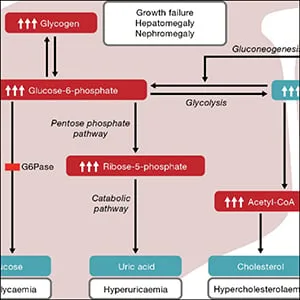Glycogen Storage Disease Type Ia: A Case Study
Glycogen Storage Disease type Ia (GSD Ia) is a rare genetic disorder that affects the body’s ability to break down glycogen, a stored form of glucose. This can lead to a variety of health complications, even with careful medical care. This article discusses a specific case highlighting the challenges of managing this condition.
Patient Presentation
We examine the case of a 20-year-old male diagnosed with genetically confirmed GSD Ia. Despite receiving optimal medical management, the patient continued to experience several serious health issues:
- Persistent Hypoglycemia: Dangerously low blood sugar levels remained a constant concern.
- Severe Hyperlipidemia: Elevated levels of fats in the blood posed a risk to cardiovascular health.
- Hepatic Adenomas: Benign tumors developed on the liver, requiring monitoring for potential complications.
- Osteoporosis: Weakening of the bones increased the risk of fractures.
Challenges in Management
This case underscores the difficulties in managing GSD Ia, even with the best available treatments. The persistent hypoglycemia, hyperlipidemia, hepatic adenomas, and osteoporosis highlight the complex interplay of metabolic disturbances associated with this condition.
Understanding GSD Ia
What is Glycogen Storage Disease?
GSD Ia results from a deficiency in the enzyme glucose-6-phosphatase, which is essential for releasing glucose from glycogen. This deficiency disrupts the body’s ability to regulate blood sugar levels, leading to hypoglycemia and the accumulation of glycogen in the liver and kidneys.
Symptoms and Diagnosis
Symptoms of GSD Ia typically appear in infancy and can include:
- Low blood sugar
- Enlarged liver
- Swollen abdomen
- Delayed growth
Diagnosis is confirmed through genetic testing.
Final Overview
This case illustrates the significant challenges in managing GSD Ia and emphasizes the need for ongoing research to develop more effective therapies for this rare genetic disorder. The patient’s experience highlights the importance of comprehensive medical management and monitoring to address the various complications associated with GSD Ia.




+ There are no comments
Add yours